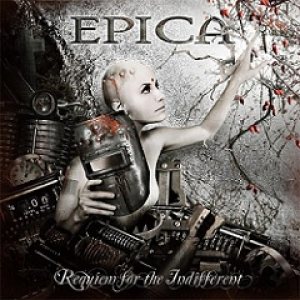
Album Review: Epica - "Requiem for the Indifferent"
In the quickly multiplying and increasingly competitive world of folk metal, bands are given an early choice between two camps, each representing one of the possible idiomatic sounds of the genre. First, you could truly embrace the roots of the music you are channeling, incorporating an increased number of traditional or esoteric instruments and arrangement. The other path, equally valid in the halls of metal, is to bend more towards the melodic death metal trend, using the folk elements as garnish surrounding the main dish of metal being served.
Epica has taken the first path, and embraced it fully by allowing sultry singer Simone Simons to fill her lungs, spread her wings and belt out nigh-operatic tones or soft, placid melodies as she sees fit. All of this is laid over a groundwork of respectable and well-produced metal that leans heavily on the melodies and standards of folk.
Firstly, the title track, and the album, are somewhat confusingly titled. If I can be allowed to nit pick for a moment, it seems somewhat inconceivable that a “Requiem for the Indifferent” would even exist. After all, would the indifferent listen to it? Still, that’s neither here nor there. The fact remains that the song is powerful, if perhaps a little too long.
That can become a common trend on “Requiem for the Indifferent,” as the songs stay within the experience of Epica’s usual fare, and their consistently meaty run times (around six minutes a pop…not eye-rollingly long, but substantial,) can cause tracks to run together in a fluid stream.
On the other hand, there are times when this album works, and it’s just as simple as that. The album’s closer “Serenade of Self-Destruction,” is long, but capitalizes on the epic potential of Epica to craft a multifaceted experience that is rewarding for those with the time.
There are some shorter, more cleanly digestible pieces to be had on “Requiem for the Indifferent,” such as the dour, minor-keyed and haunting “Storm the Sorrow,” which is a song that belongs on the soundtrack of a dark and mysterious movie. Whether or not it is the album’s most virile or best piece is up for debate, but it is certainly the most wonderfully mercurial and haunting.
As a general rule, and in following with many folk metal releases of this type, Epica is at their apex when employing their talent for galloping power rhythms and overlaying the intricacy of the traditional instruments. In these moments, the band composes songs with swiftness and authority. Conversely, the band is at their nadir when trying to write meaningful, emotional ballads. “Deep Water Horizon” (assumedly a song about the former oil platform of the same name, but perhaps not,) and others like it try to tread the difficult, thin line between emotional appeal and melodrama, but fall to the side of melodrama more often than not. As luck would have it, these songs are outnumbered on the album by the “good” songs, in layman’s terms.
No one is debating Epica's talent for crafting top-notch, over the top folk metal epics, but what I would have liked to see is some diversity. Simone Simons has such a powerful, ringing voice that the audience should be allowed to see exactly what her range is. The band never strays from the pocket of the things they know how to do well, when experimentation and musical dynamism could have (and perhaps should have,) been the order of the day. What would they sound like with Simons in a desperate rasp, or a gritty, sexy, lounge-y purr? This album leaves that question disappointingly up for debate.
In the meantime, enjoy Epica’s “Requiem for the Indifferent” for what it is; a solid, perhaps predictable album that lacks suspense, but hits its share of high notes (both literally and figuratively,) and will serve you well if not taken too seriously. There are many bands of similar ilk who could learn a lesson or two about professionalism from veterans like Epica.

